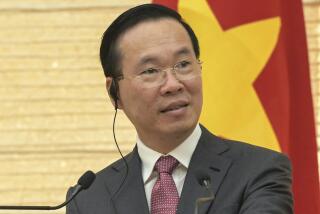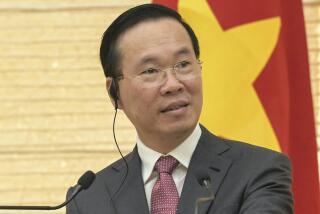Vietnam Will Stay Socialist, Premier Says
- Share via
HANOI — Prime Minister Phan Van Khai said Saturday that Vietnam will move cautiously in adopting economic reforms in 1999 and that it intends to continue building a socialist economy.
His comments, made during a conference with diplomats and journalists, are sure to disappoint foreign investors who had hoped that Vietnam would take some bold moves to revive its economy and move toward a true free-market economy.
“We need to maintain a leading role for state enterprises,” Khai said. He added that if Vietnam can address its current economic downturn, the country can continue “on the path toward socialism.”
Speaking a block from a city park graced by a 12-foot statue of V. I. Lenin, Khai--considered a reformer among the old guard Communists who still run Vietnam--said, in effect, that the government will follow a dual course incorporating both socialism and capitalism.
He said Vietnam has to do more to stem a dramatic drop in foreign investment, and he pledged to improve the business climate.
The privatization of some state enterprises, he said, will continue, and he dismissed reports, widely circulated in diplomatic circles, that a struggle is underway in the Communist Party between reformers and conservatives over the pace and future of economic and political reforms.
“We obviously have debate and discussion,” he said, “but outsiders often find it difficult to understand that we don’t have radical or conservative forces. . . . We have unanimity on policies of reform.”
Vietnam’s cautious approach toward reform, its increasing corruption and layers of bureaucracy have led to frustration among foreign investors. Many gave up in 1998 and closed their operations.
No American corporation has made a profit in Vietnam since the U.S. trade embargo was lifted in 1994, U.S. diplomats say.
Yet despite the Asian fiscal meltdown, Vietnam’s economy still managed to grow by 6% last year, the best performance of any Southeast Asian nation. The World Bank is forecasting 3% to 5% growth in 1999. At the lower range of that level, economists say, millions of farmers could slip back into poverty.
Vietnam has responded to the regional crisis not by making reforms and restructuring its financial system, as have some of its neighbors, but by becoming more introverted, cautious and conservative.
Economists fear that the inaction could leave Vietnam in the dust once Thailand, Singapore, Malaysia and other countries recover from the crisis and resume their economic growth with more efficient fiscal structures in place.
Khai told the diplomats and journalists that Vietnam plans to accelerate rural development--80% of the country’s 77 million people are farmers--and said skeptics tend to overlook the fact that Vietnam has made tremendous progress in the last 10 years. It is an assessment that economists and political analysts do not dispute.
Khai said some of the gravest problems facing Vietnam are what he called social vices, among them a growing drug problem and widespread corruption. The legitimacy of the Communist Party, he said, rests on its promise to improve the lives of Vietnam’s people.
More to Read
Sign up for Essential California
The most important California stories and recommendations in your inbox every morning.
You may occasionally receive promotional content from the Los Angeles Times.












